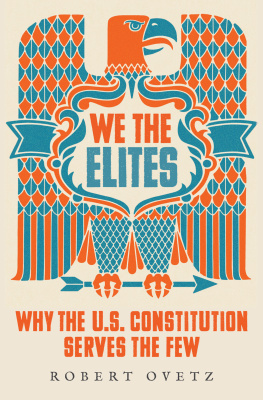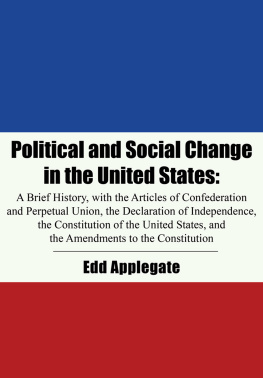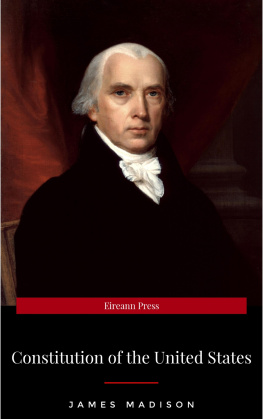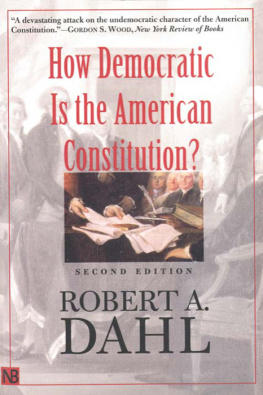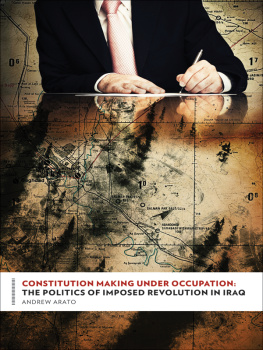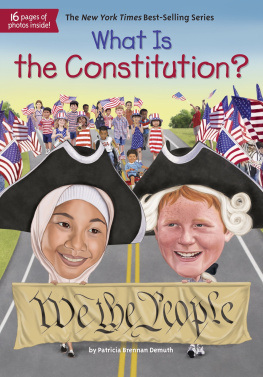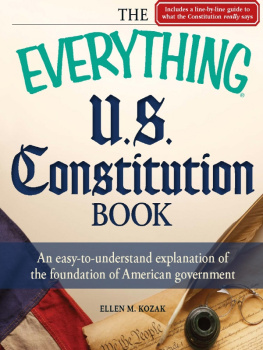Contents
Guide
We the Elites
As US capitalisms decline brings its victims and critics into oppositional unity, Ovetzs important new book powerfully addresses how the constitution and US politics reinforce capitalism and its dysfunction. It offers insights crucial for the big changes coming.
Richard D. Wolff, Professor Emeritus of Economics, University of Massachusetts, Amherst and author of The Sickness is the System
A crucial and timely corrective about what words like democracy and freedom actually meant to the Founders. A gift to serious analysts of US politicsbut, more importantly, to those who would build a system that serves people rather than property.
Olf.mi O. Tw, Assistant Professor of Philosophy, Georgetown University and author of Elite Capture: How the Powerful Took Over Identity Politics (And Everything Else)
This ambitious, stimulating, thoughtful, exceedingly informative book sets a new standard in scholarship on the vaunteddare I say overrated?US Constitution.
Gerald Horne, author of The Counter-Revolution of 1776:
Slave Resistance and the Origins of the USA
We the Elites
Why the US Constitution
Serves the Few
Robert Ovetz

First published 2022 by Pluto Press
New Wing, Somerset House, Strand, London WC2R 1LA
www.plutobooks.com
Copyright Robert Ovetz 2022
The right of Robert Ovetz to be identified as the author of this work has been asserted in accordance with the Copyright, Designs and Patents Act 1988.
British Library Cataloguing in Publication Data
A catalogue record for this book is available from the British Library
ISBN 978 0 7453 4473 7 Hardback
ISBN 978 0 7453 4472 0 Paperback
ISBN 978 0 7453 4476 8 PDF
ISBN 978 0 7453 4474 4 EPUB
This book is printed on paper suitable for recycling and made from fully managed and sustained forest sources. Logging, pulping and manufacturing processes are expected to conform to the environmental standards of the country of origin.
Typeset by Stanford DTP Services, Northampton, England
Simultaneously printed in the United Kingdom and United States of America
Contents
Preface
This book has been a project many years in the making. Ever since I read Michael Parentis Democracy for the Few and William Domhoffs Who Rules America (which I just learned is still in print) as an undergraduate, and later Charles Beards An Economic Interpretation of the Constitution of the United States several decades ago, I looked far and wide for a class analysis of the Constitution and found precious little. I am eternally grateful for what they taught me and have sought to pass it along to my thousands of undergraduate students in my Introduction to US and California Government and Politics students at four community colleges and three universities where I have taught as an untenured professor, sometimes at three or even four at the same time. I am forever grateful for their patience and passion for learning.
This book would not have been possible without the loving guidance of my editor, David Shulman, at Pluto Press who first unexpectedly asked me what book I would like to write when we met four years ago in London. He immediately embraced this book and has continued to do so despite my frustrating behavior. Your support, patience, and firmness helped make this a much better book. This book would not have been possible without the help of others at Pluto including Patrick, James, Kieran, Emily, Robert, and Dan. I am also eternally grateful to Manny for all his years of support for my work.
Writing this book totally absorbed my attention when Darshana and I joined families. Thank you for always being there when I emerge from the groove. This book is for my daughter Nisa. May it help clear a way for the fight you have just begun and can win.
West Marin County, CA, USA
April 1, 2022
Introduction: The United States, Democracy or Republic?
At the beginning of my Introduction to US Government class, I always ask my students the same question: What type of system of government do we have?
The overwhelming majority consistently give the same answer: they have no idea. Is it a republic? A democracy? A representative democracy? A democratic republic? An oligarchy? A plutocracy? The one no one ever picks is a monarchy. Those of us who grew up in the USA have learned since childhood that the USA rebelled against a king.
My students are not as confused as they think they are. We cannot agree on what to call the US systemalmost unchanged since 1787because it clearly does not actually function the way we are told to believe it does.
The Framers of the Constitution, like their fellow wealthy elites, abhorred democracy as impossibly both anarchic and despotic. Democracy meant rule by the people out of doors, a term used for the common people who literally worked outside, who held not merely the vote but also the power to make laws about propertyproperty belonging to the elite.
The aim of the Framers was to form a republic. A republic is a representative system that lacks a king and aristocracy. It allows only the propertied elites to vote for their own who rule the entire population. They are under no obligation to make decisions by majority rule and most often make decisions according to influence, power, rank, and status. Any system with representatives, including authoritarian systems, are republics because they have representatives even if they are not elected.
The Framers designed a republic because they tossed out the monarchy and aristocracy and left all power in the hands of the propertied elites. In our system, only white men with a certain amount of property could originally vote and even their vote was limited to electing some of their representatives, while lacking the power to remove the rest and having no authority to make law or change the Constitution. As our system of voting has expanded it could now better be called a democratic republic or representative democracy. The USA is not a direct democracy because the people cannot directly make the law, decide policy, or vote on issues of taxes, war, and peace themselves without an intermediary.
The Framers genius was in designing a virtually unchangeable system that provides the people with a semblance of participation and allows a few to select some representatives while the rest of us relinquish the power to self-govern. How and why they did that, why it still functions in that same way, and why we need to move past it is the focus of this book.
Its no accident that mavericks, outsiders, and independents run for office promising to go around and above the Constitution. Despite learning that our constitutional system works according to majority rule, that elections matter, and that pluralist coalitions of interest groups can become the majority and put power into the hands of the common people, in reality the Constitution makes majority rule the exception and not the rule. More often than notin fact, throughout the countrys entire history, with just a handful of exceptionsthe system has thwarted the will of both the economic and political majority.
The electoral college, our bicameral Congress, supremacy power, executive veto, the Inter-state commerce clause, the President, treaty making, and the high threshold to amend the Constitution, among many other features, are all part of the reason why the Constitution impedes political democracy and prevents economic democracy. The 39 Framers who signed the Constitution in September 1787 were intent upon using separation of powers and checks and balances to compartmentalize the powers of the federal government, making it nearly impossible for the majority to rule each branch of the national government at the same time. Just to be sure, in the event that the majority should rule any one branch, the other two branches would be able to check and thwart them.

